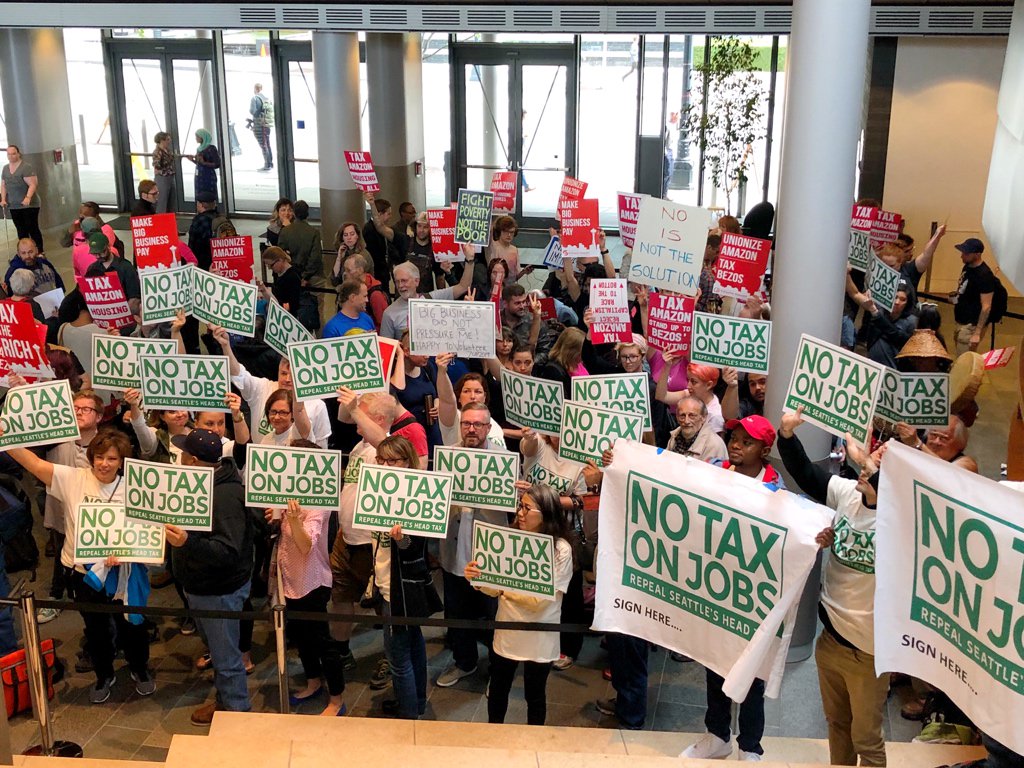- City council votes 7-2 to reverse unanimous May decision
- Per-worker tax would have raised $50 million for homeless aid
Less than a month after unanimously passing a per-worker tax on large employers like Amazon.com Inc., the Seattle City Council voted 7 to 2 to repeal the new tax, which was set to provide almost $50 million for homeless services and affordable housing.
The reversal caps a tense few weeks in the city, where signature-gatherers — some volunteer, some paid by the business community — stood at parks, grocery stores and transit stops to sign up enough people to put a repeal on the November ballot. The council’s move Tuesday means the employer tax issue won’t face the city’s voters.
The council initially approved the tax of $275 per employee — called a head tax — in response to the region’s growing homeless population, which has swelled to more than 12,000 people. Local lawmakers had passed the bill last month despite a rare public rebuke from e-commerce giant Amazon, the city’s dominant private employer, which paused its expansion plans in the city pending the outcome of the vote. The debate unleashed tense local divisions, exposing the anxieties of being the fastest-growing big city in the U.S. It also offered a warning to cities looking to court Amazon for its second headquarters about the political tensions such rapid growth can bring.
In a matter of weeks after the tax passed, the business community raised more than $280,000 for the repeal campaign, dubbed No Tax on Jobs, including a $25,000 donation from Amazon. Most of the campaign’s funding went to hire an Arizona-based signature-gathering firm called Morning In America. A counter effort, sponsored by the Service Employees International Union, raised about $70,000 to convince voters not to sign the petition.
In a statement, Amazon Vice President Drew Herdener said the vote was “the right decision for the region’s economic prosperity.” The company is “deeply committed to being part of the solution to end homelessness in Seattle and will continue to invest in local nonprofits like Mary’s Place and FareStart that are making a difference on this important issue,” he said.
While a report by McKinsey & Co. said the region needed to double its funding for homelessness, in particular to build more affordable housing, Amazon and the business community said new city resources weren’t necessary. “The city does not have a revenue problem – it has a spending efficiency problem,” Herdener said after the initial head-tax vote. The message gained traction with some homeowners, frustrated by the city’s response to homelessness, in particular tents and RVs moving into residential neighborhoods.
Ultimately the repeal campaign got more than 45,000 signatures. About 15,000 came from volunteer signature-gatherers, according to Jon Scholes, president of the Downtown Seattle Association, which was involved in the effort. Referendums need about 16,500 verified signatures to reach the ballot. Scholes said they city’s response to homelessness has been “inconsistent, sometimes incoherent,” and “the politics of this jobs tax sucked a lot of energy” from other regional efforts to address the problem.
The council saw the writing on the wall. Councilmember Mike O’Brien, who first proposed a head tax last fall, said in an interview that he came to the conclusion that a costly, months-long battle ahead of the election wouldn’t help the city. “I look at what the campaign looks like, with the business community spending millions on a message that Seattle is wasting our money, and good folks fighting on the other side that I agree with, that this is needed, but with heated rhetoric all around that this is an existential battle for the city,” he said, “I worry we’d get to the end and are beat up and don’t have a solution.”
The about-face follows the same pattern as in 2014, when the council tried to strictly regulate Uber and other ride-sharing providers, which raised more than $400,000 to repeal legislation. The council backpedaled and repealed its own ordinance. “With enough money, you can send anything to a vote,” O’Brien said.
Seattle is also home to coffee-shop chain Starbucks Corp., which has criticized the head tax and the council’s approach to combating homelessness. Starbucks Senior Vice President John Kelly welcomed the repeal. “We believe the best path forward is to implement the reforms recommended two years ago by the city’s own homelessness expert,” Kelly said in a statement.
Mayor Jenny Durkan has signaled she’d sign the repeal, though the margin is veto-proof.
The council meeting before the repeal vote was raucous, with some public speakers decrying what they called a rushed capitulation without public hearings, and others in support of the repeal saying their uprising against the council was just beginning.
